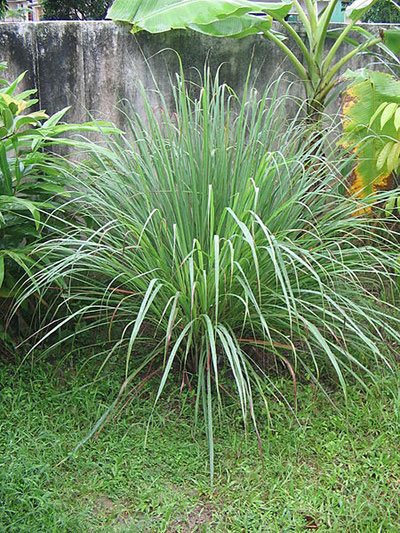Lemongrass

Lemongrass
Image source -
https://en.wikipedia.org/wiki/File:YosriNov04Pokok_Serai.JPG - CC

Botany And History
Lemongrass is a plant that is native to India and a large part of Asia, where it is most commonly used as a culinary and medicinal herb. Despite being considered a native to several parts of the Asiatic continent, this hardy plant can grow nearly anywhere provided that the weather be at least warm and semi-tropical. It thrives in the tropical areas of the Old World, and Oceana and is typified by its long, slender, silky-coarse and often sharp, pointed leaves and red stalks. This hardy plant grows year-round and can be harvested by simply cutting off the leaves from the stem that is implanted near the ground (this is done to promote re-growth), or otherwise pulled out of the ground and used roots, stems, and leaves in-all. [1] Lemongrass is known for its distinct citrusy aroma, all the more redolent during balmy nights when it can be wafted into the surrounding area.
Lemongrass - Herbal Uses
The most common uses of lemongrass in the places where it thrives is as a culinary herb that is added into a wide variety of dishes, be it soups, stews, curries, and even marinades and roasts. Lemongrass is a very versatile herb in that it works with a vast array of foodstuffs, whether it is beef, fish, poultry, or game. The versatility also extends to its usage, as it can be used fresh (which is the most common method of usage), dried, or in powdered form. In Chinese and Philippine cuisine, it is a common additive to fish and chicken-based soups and stews, usually used fresh. For roasts and barbeques (such as roast chicken, pork, lamb, goat or duck), it can be used as a stuffing by itself or alongside other herbs and spices, or as a marinade when mixed with soy sauce, vinegar, and a wide assortment of herbs and spices. [2]
This culinary herb may also be used medicinally, and its uses as a culinary herb go hand in hand with its medicinal purposes. It is commonly employed as a remedy for chills or fever when used in tandem with ginger as an additive to chicken or fish soup (called 'tinola' in Philippine cuisine). Its therapeutic benefits may also be gleaned sans its addition to foodstuffs, as it can also be made into tea by employing either dry, fresh, or powdered lemongrass and decocting (for the dry and fresh whole leaves) or infusing (for the powdered leaves) it in boiling or hot water. [3]
A mild to strong decoction of lemongrass is a useful tea to aid in digestion, as well as to help relieve the symptoms of colds and fevers. It may also be drunk prior to sleep to help relieve stress and anxiety. Lemongrass tea may be drunk as a quick remedy for upset stomachs, diarrhea, and dyspepsia. Some studies have even suggested that lemongrass can help to fight certain types of cancer, making it a highly potent herb to always have around the kitchen.
Lemongrass also possesses potent antibacterial, antifungal, and antimicrobial properties, making it an excellent rinse for wounds and other skin problems. [4] A strong decoction of lemongrass leaves mixed with ginger and rosemary makes for an excellent hair rinse to promote growth, as well as control excessive sebum production and combat dandruff. Care should be taken when employing lemongrass as a rinse for wounds and other skin infections though, as some people with very sensitive skin (or individuals with skin asthma) may experience itchiness, redness, or a burning or stinging sensation on the skin if it comes into contact with lemongrass. [5]
When infused with oil by itself, or with other medicinal herbs, lemongrass can be used to help relieve the symptoms of rheumatism and general muscular discomfort. This infusion may be done by macerating the dried leaves in a carrier oil (sunflower, safflower, coconut, almond, sesame, jojoba, olive, etc.). Lemongrass essential oils may also be used for faster results. This oil may also be used as an all-natural mosquito repellant when rubbed in small amounts to the skin. [6]
In aromatherapy, lemongrass, when employed as either an incense in its dried and powdered form, or as a diffuser aroma in its essential oil form, may be used to help relieve anxiety, depression, and fatigue. Lemongrass essential oil or incense may also be used to repel pesky insects such as flies and mosquitoes, however, take caution when using anything made of lemongrass near bees, as it is highly inviting to them, making it highly indispensable for horticulturists. [7]
In magickal practice, lemongrass is used in much the same way sweet grass is used by Native Americans. In Filipino shamanism, dried lemongrass leaves are burnt by shamans as an offering to forest spirits, or as an offering to gods. Dried lemongrass may also be used as a in incense that is wafted around the community to help ward off illness or hexes, and can double as a smudging herb to cleanse one's person prior to initiating any ritualistic activity.
Lemongrass - Contraindications And Safety
Care should be taken when consuming lemongrass in excess, for while it may be therapeutic, it can, as with most herbal remedies, interact with synthetic medicines and may cause detrimental side-effects. People with hypoglycemia and people who suffer frequent bouts of hypertension should use lemongrass sparingly, if not at all.
Names of Lemongrass, Past and Present
Chinese: xiang mao cao
Thai: ta-khrai hom
Urdu: chukku kaapi
Marathi: gavati chaha (lit. 'grass tea')
Malayalam: inchippullu
Filipino: tanglad / balioko / barani
Spanish: paja de meca / zacate limon / hierba de limon / hierba Luisa
French: citronelle (other names exist, usually denoting place of origin) / jonc odorant
English: lemongrass / citronella / fever grass
Latin (scientific nomenclature): Cymbopogon citratus (other varieties exist, each with their own scientific nomenclature; C. citratus being the most
commonly employed variant for medicinal purposes)
References:
[1] https://en.wikipedia.org/wiki/Cymbopogon
[2] https://www.stuartxchange.org/Tanglad.html
[3] https://lifestyle.inquirer.net/wellness/wellness/view/20100323-260252/Lemon-grass-helps-prevent-cancer-fungal-infection-and-mosquito-bite
[4] https://wakeuphils.wordpress.com/2009/03/01/health-benefits-of-lemon-grass/
[5] https://www.webmd.com/vitamins-supplements/ingredientmono-719-LEMONGRASS.aspx?activeIngredientId=719&activeIngredientName=LEMONGRASS
[6] https://www.medicalhealthguide.com/herb/lemongrass.htm#b
[7] https://en.wikibooks.org/wiki/Beekeeping/Guide_to_Essential_Oils
Main article researched and created by Alexander Leonhardt
© herbshealthhappiness.com


1. Famous Chef Sheds 60lbs Researching New Paleo Recipes: Get The Cookbook FREE Here
2. #1 muscle that eliminates joint and back pain, anxiety and looking fat
3. Drink THIS first thing in the morning (3 major benefits)
4. [PROOF] Reverse Diabetes with a "Pancreas Jumpstart"
5. Why Some People LOOK Fat that Aren't
6. Amazing Secret Techniques To Protect Your Home From Thieves, Looters And Thugs
7. The #1 WORST food that CAUSES Faster Aging (beware -- Are you eating this?)
If you enjoyed this page:



























